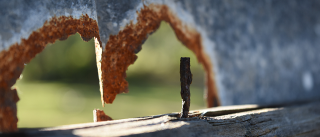Did you accidentally step on a rusty screwdriver and now you’re wondering if you can get tetanus? Well, you’ve come to the right place! In this article, we’ll explore the question “Can you get tetanus from a screwdriver?” and provide you with all the answers you need. So let’s dive in and find out what you need to know about this potential health concern.
Tetanus, also known as lockjaw, is a serious bacterial infection caused by Clostridium tetani. It usually enters the body through a wound or cut, and there’s a common belief that rusty objects, like a screwdriver, can increase the risk of tetanus. But is that really true? We’ll explore this question in detail, so you can have a clear understanding of the risks involved when dealing with rusty tools.
When it comes to tetanus, prevention is key. So, whether you’ve had an encounter with a rusty screwdriver or you’re simply curious about the topic, keep reading to gain the knowledge necessary to protect yourself and stay informed. It’s time to debunk the myths and empower ourselves with the right information about tetanus and its potential sources, like a screwdriver. Let’s get started!

Can You Get Tetanus from a Screwdriver?
Tetanus is a serious bacterial infection that affects the nervous system and can lead to muscle stiffness and spasms. It is commonly associated with rusty nails, but can you get tetanus from a screwdriver? In this article, we will explore the risk of tetanus when dealing with screwdrivers, the importance of tetanus vaccinations, and steps you can take to prevent tetanus infections.
The Risk of Tetanus with Screwdrivers
Screwdrivers, like any sharp or piercing object, have the potential to introduce the tetanus bacteria into the body if not handled properly. The bacteria, known as Clostridium tetani, can live in soil, dust, and manure, and can easily contaminate a screwdriver, especially if it has come into contact with these substances. So, if you accidentally puncture your skin with a dirty screwdriver, it is crucial to consider the risk of tetanus infection.
However, it is important to note that tetanus bacteria require an environment devoid of oxygen to thrive. Rust, which is commonly associated with tetanus, does not actually cause or promote tetanus. Therefore, the risk of tetanus infection from a clean, rust-free screwdriver is significantly lower compared to a dirty or rusty one. Nonetheless, it is always better to err on the side of caution and take necessary precautions to prevent tetanus infections when handling any sharp objects, including screwdrivers.
Importance of Tetanus Vaccinations
Vaccination is the most effective way to protect oneself from tetanus. The tetanus vaccine is a part of the DTaP (diphtheria, tetanus, and pertussis) vaccine, which is routinely given to children in a series of doses. For adults, a booster vaccine known as Tdap (tetanus, diphtheria, and pertussis) is recommended every 10 years to maintain immunity against tetanus.
However, if you have not received a tetanus shot in the past 10 years and have a puncture wound from a screwdriver, it may be necessary to get a tetanus booster shot. Tetanus can be a life-threatening condition, so it is crucial to seek medical attention if you are unsure about your vaccination status or if you experience any symptoms of tetanus after a screwdriver injury.
Preventing Tetanus from Screwdriver Injuries
To prevent tetanus infections from screwdriver injuries, there are several steps you can take:
1. Keep Your Vaccinations Up to Date:
Ensure that you and your family are up to date with the recommended tetanus vaccination schedule. Regular booster shots every 10 years are essential to maintain immunity against tetanus.
2. Handle Screwdrivers Properly:
When using screwdrivers, always exercise caution and be mindful of your surroundings. Keep the screwdriver pointed away from your body and use it in a controlled manner to reduce the risk of accidental puncture wounds.
3. Clean and Care for Wounds:
If you do sustain a puncture wound from a screwdriver, thoroughly clean the wound with soap and water. Applying an antiseptic ointment can also help prevent infection. If the wound is deep or shows signs of infection, seek medical attention.
4. Use Protective Gear:
When working with screwdrivers or any other potentially hazardous tools, use appropriate protective gear, such as gloves or eye protection, to minimize the risk of injury and subsequent infection.
5. Maintain a Clean Work Environment:
Keep your work area clean and free of debris or objects that could increase the risk of injuries. Regularly sanitize your tools, including screwdrivers, to reduce the likelihood of contamination.
Conclusion
While the risk of contracting tetanus from a screwdriver is generally low, it is always important to exercise caution and take appropriate preventative measures. Keeping your tetanus vaccinations current, handling screwdrivers safely, and promptly attending to any injuries can greatly reduce the risk of tetanus infection. Stay informed, stay protected, and stay safe!
Key Takeaways: Can You Get Tetanus from a Screwdriver?
- Yes, it is possible to get tetanus from a screwdriver if the tool is rusty or contaminated.
- Tetanus is caused by a bacterium called Clostridium tetani, which can enter the body through a puncture wound.
- It is important to keep your tetanus vaccination up to date to protect yourself from the disease.
- If you sustain a puncture wound with a rusty or dirty screwdriver, it is recommended to clean the wound thoroughly and consult a healthcare professional.
- Remember to always practice good hygiene and keep your tools clean to prevent the risk of tetanus infection.
Frequently Asked Questions
Tetanus is a serious bacterial infection that can cause muscle stiffness and spasms. While there are various ways to get tetanus, one common concern is whether or not you can contract tetanus from a screwdriver. Here are some frequently asked questions related to tetanus and screwdrivers, along with their answers.
Can you get tetanus from a rusty screwdriver?
Yes, it is possible to get tetanus from a rusty screwdriver if the bacteria that cause tetanus are present on the metal surface. Tetanus bacteria can survive in the environment, especially in soil, dust, and rust. If you are punctured or injured by a rusty screwdriver, and tetanus bacteria enter your bloodstream through the wound, it can lead to tetanus infection. It is important to ensure that your tetanus vaccinations are up to date to protect yourself.
If you haven’t received a tetanus shot in the last 10 years or are unsure about your immunization status, it’s recommended to seek medical attention after a puncture or injury with a rusty screwdriver. A healthcare professional can evaluate your risk and administer a tetanus booster, if necessary.
Is tetanus only caused by rusty objects?
No, tetanus can be caused by more than just rusty objects. While rust may harbor tetanus bacteria, any object, whether rusty or clean, that introduces the bacteria into a deep wound can cause tetanus. Tetanus bacteria thrive in environments with low oxygen, such as wounds that are deep or have dirt or debris in them.
The most important factor in contracting tetanus is not the object itself, but the presence of the bacteria. Even clean objects can transfer bacteria if they come into contact with contaminated surfaces. Therefore, it is essential to clean and properly care for any wound to prevent the risk of tetanus.
Can washing a wound with soap and water prevent tetanus?
Yes, washing a wound with soap and water is an important step in preventing tetanus. Cleaning the wound helps remove dirt, debris, and bacteria that may be present, which can significantly reduce the risk of tetanus infection. However, cleaning alone may not guarantee complete protection against tetanus.
It is crucial to seek medical attention and consult a healthcare professional after any deep or dirty wound. They can assess the injury and determine if a tetanus booster shot is necessary based on your immunization history and the specific circumstances of the wound.
How often should I get a tetanus booster?
A tetanus booster shot is typically recommended every 10 years to maintain immunity against tetanus. The primary tetanus vaccination series includes a series of shots given during childhood, followed by booster shots throughout adulthood.
However, certain situations may require earlier booster shots, such as a deep or dirty wound or an injury caused by a contaminated object. It’s always best to consult with a healthcare professional who can evaluate your specific circumstances and provide personalized advice.
What are the symptoms of tetanus?
The symptoms of tetanus can vary but often include muscle stiffness and spasms, especially in the jaw muscles (known as “lockjaw”). Other signs may include difficulty swallowing, muscle stiffness in the neck and abdomen, fever, sweating, and a rapid heart rate. In severe cases, tetanus can affect the muscles responsible for breathing, leading to respiratory problems and potentially life-threatening complications.
If you experience any signs or symptoms of tetanus, seek immediate medical attention. Early treatment can help prevent the infection from progressing and becoming severe.

DIY Hack – Magnetize Your Screwdrivers
Summary
So, can you get tetanus from a screwdriver? The answer is yes, you can. Tetanus is caused by bacteria that can enter your body through a puncture wound, like one from a screwdriver. It’s important to keep your tetanus vaccination up to date, especially if you work with tools or are exposed to rusty objects. If you do get a puncture wound, make sure to clean it well and seek medical attention if necessary.
Remember, tetanus is a serious infection that can affect your muscles and nerves, causing stiffness and even difficulty breathing. By taking proper precautions and keeping your tetanus vaccination current, you can protect yourself from this potentially dangerous disease. Stay safe!
